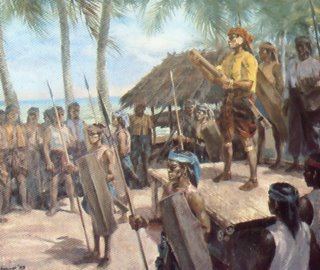
WINDOW ON MANILA
Breaking the code
ALAN ROBLES
Never mind Da Vinci; there's a more insidious "code" plaguing the Philippines. A government official defending the planned shift to a parliamentary system recently cited the Code of Kalantiaw, a set of pre-Hispanic laws named after the chief, or datu, who supposedly wrote them in 1433 in Aklan province.
There's one problem: the code and the datu are a fraud, foisted on the country in 1914 by a man who is possibly the nation's most destructively prolific forger. Jose Marco's first work was a
mediocre, useless history book. He then shifted to a more rewarding career, inventing "old" manuscripts. One contained the Kalantiaw Code, which became popular as an example of early Filipino penal law.
Although I was forced to memorise it, like millions of schoolchildren, the only thing I remembered was its un-Filipino-like barbarity. The code is an exercise in capricious sadism. Transgressors have their fingers sliced off, are exposed to ants, thrown to sharks and crocodiles or crushed with stones. It makes you wonder about the parenting the writer received.
There's little judicial sense to it. A subject who breaks into his chief's house is sentenced to death, but if he canoodles with the headman's wife he is only enslaved. And if a villager kills a black cat - it's off to the anthill.
Marco's hogwash was exposed in 1968 by a scholar, the late William Henry Scott, who noted many crude errors and inconsistencies. He was unable to find any of the people Marco allegedly got the documents from. Before dying in 1963, Marco poisoned Philippine history with other fakes, including a novel, La Loba Negra, allegedly written in 1869 by a national hero, father Jose Burgos.
A philatelist, Marco was notorious for trading fake stamps. The two schools where he claimed he studied had no records of his attendance. In 1951, when a friend's daughter needed a topic for a thesis, Marco obligingly whipped up yet another spurious manuscript.
"Kalantiaw" grew in the telling. One historian actually concocted quotations of the fake datu. In 1971, president Ferdinand Marcos created the Order of Kalantiaw award. That could be one reason the fraud has been a long time dying: think of the red faces if award recipients were told their medals should be renamed Order of Datu Baloney.
In 1994, the National Historical Institute issued a book describing Kalantiaw as an "ancient Filipino lawgiver". There's still a Kalantiaw shrine in Aklan commemorating the man who had "the wisdom
of Solon, the fighting prowess of Genghis Khan and the sagacious statesmanship of Asoka". And, someone might add, the authenticity of Tarzan, Lord of the Jungle.
(Originally published in the South China Morning Post, June 8, 2006. SCMP.com is the premier information resource on Greater China. Courtesy pldt@yahoogroups.com Photo from www.mts.net)
No comments:
Post a Comment